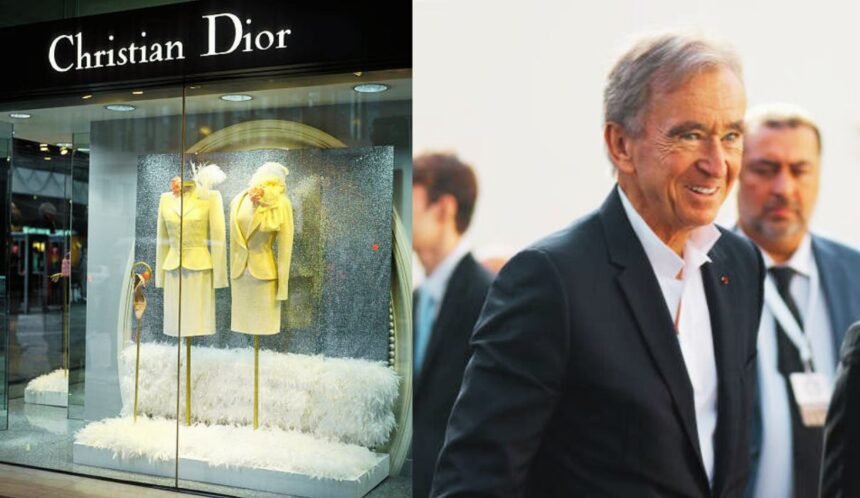Bernard Arnault is one of the most influential business leaders in the luxury goods industry. He serves as Chairman and CEO of LVMH (Moët Hennessy Louis Vuitton) and Chairman of Christian Dior SE.
Arnault has built LVMH into the world’s largest luxury conglomerate, with over 70 brands including Louis Vuitton, Dior, Celine, Givenchy, Hennessy, and Sephora. He is known for his business acumen, drive, and vision in building this luxury empire.
In 2017, Arnault made headlines with his massive $13.1 billion buyout of Christian Dior SE. This deal allowed him to gain full control of the iconic Christian Dior brand and further solidify LVMH’s dominance in luxury fashion.
Early Life and Career
Bernard Jean Étienne Arnault was born on March 5, 1949 in Roubaix, France. He comes from a family of entrepreneurs and grew up working in his father’s civil engineering company, Ferret-Savinel.
After graduating from the prestigious École Polytechnique in 1971 with an engineering degree, Arnault joined his father’s company. He helped expand the business into real estate development.
In 1976, Arnault was tasked with restructuring the Financière Agache holding company, which had acquired the Boussac Saint-Frères textile empire that owned major French fashion houses like Christian Dior. Arnault revitalized several of the company’s brands and even revived the House of Dior. This early experience with luxury brands set the stage for his future career.
Creation of LVMH
In 1984, Arnault put together a $15 million takeover of Boussac Saint-Frères. This allowed him to gain control of Christian Dior.
In 1987, he sold most of Boussac’s assets to focus on building up Christian Dior into a luxury powerhouse. That same year, he engineered a $1.5 billion hostile takeover of LVMH.
LVMH (Moët Hennessy Louis Vuitton) was formed in 1987 as a merger between the champagne producer Moët et Chandon and the luxury retailer Louis Vuitton. By taking over LVMH, Arnault acquired Louis Vuitton and brands like Hennessy cognac and high-end champagne vineyards.
Through the 1990s, Arnault expanded LVMH rapidly by acquiring several other iconic luxury brands. Some of the major acquisitions during this period included Berluti (1993), Guerlain (1994), Marc Jacobs (1997), Sephora (1997), and Thomas Pink (1999).
Arnault invested heavily into these brands, opening flagship stores, funding expansion, and repositioning them to resonate with modern luxury consumers. This strategy helped elevate LVMH into a global luxury powerhouse.
Growth and Expansion of LVMH
Under Arnault’s leadership, LVMH has grown into the world’s largest luxury goods conglomerate with over $50 billion in annual revenue. It now comprises 75 prestigious brands across five sectors:
- Wines & Spirits: Moët & Chandon, Veuve Clicquot, Hennessy, Dom Pérignon, Glenmorangie
- Fashion & Leather Goods: Louis Vuitton, Christian Dior, Fendi, Celine, Givenchy, Kenzo, Berluti
- Perfumes & Cosmetics: Guerlain, Benefit Cosmetics, Make Up For Ever, Acqua di Parma
- Watches & Jewelry: TAG Heuer, Bulgari, Tiffany & Co., Hublot, Zenith
- Selective Retailing: Sephora, DFS Galleria, Le Bon Marché
Some of LVMH’s major achievements under Arnault include:
- Transforming Louis Vuitton from a luggage company into a global fashion empire worth over $10 billion
- Establishing Christian Dior Couture as the pinnacle of luxury fashion and growing it into a billion dollar brand
- Turning Sephora into the world’s largest prestige beauty retailer with over 2,300 stores globally
- Engineering the $16.2 billion acquisition of Bulgari in 2011, LVMH’s largest deal ever at the time
- Opening up profitable new markets like China to drive growth and now generating over 30% of revenue from Asia
Arnault has also invested heavily in establishing LVMH as a major patron of art, culture, and architecture. The LVMH Foundation supports young artists and designers. The group also owns famed French vineyards and supports music and film festivals.
This world-class image has elevated LVMH’s brands and helped attract top creative directors like Marc Jacobs, Nicolas Ghesquière, and Clare Waight Keller to helm Arnault’s fashion houses.
Full Control of Christian Dior
While Arnault had long controlled Christian Dior through LVMH, the fashion house still had minority shareholders like French billionaire Bernard Arnault.
In 2017, Arnault decided to buy out these shareholders and gain full control over Christian Dior. LVMH purchased the 26% stake it did not already own for approximately $13.1 billion. This took LVMH’s ownership of Christian Dior to 100%.
By taking full control of Dior, one of the most prestigious couture houses in fashion, Arnault consolidated power over the lucrative brand. Dior has thrived under Arnault, growing into a nearly $2 billion brand and the cornerstone of LVMH’s fashion empire.
This landmark deal also simplified LVMH’s complex capital structure. As part of the buyout, Arnault decided to fold Christian Dior’s operating activities into LVMH. This provided more transparency and direct control moving forward.
The massive buyout was financed partially in cash and through the sale of LVMH’s stake in French supermarket chain Carrefour. It demonstrated Arnault’s commitment to owning all of LVMH and Christian Dior outright for long-term growth.
Impact on the Luxury Industry
As CEO of LVMH, Bernard Arnault has profoundly influenced the global luxury industry:
- He transformed the landscape by turning LVMH into the world’s largest luxury conglomerate through constant acquisitions of top brands.
- Many credit his vision and business prowess for the global success of Louis Vuitton, Christian Dior, and Sephora.
- LVMH set the standard for marketing, brand management, and elevating the customer experience across retail, fashion, wines, and cosmetics.
- Arnault’s focus on creativity, quality, and synergy across LVMH’s brands attracts top designers and creative directors.
- His investments and patronage makes LVMH a force in European art, culture, and architecture.
- By taking iconic French houses global, Arnault played a key role in the rise of worldwide demand for luxury products.
- The buyout of Christian Dior further cemented LVMH’s dominance in global luxury at a time when demand continues to grow, especially in Asia.
While LVMH faces competition from groups like Kering and Richemont, Arnault’s proven track record suggests that the conglomerate will continue to thrive under his guidance. His ownership provides stability and a strategic vision that benefits LVMH’s luxury brands.
Management Philosophy and Leadership Style
Bernard Arnault has developed a reputation as an astute yet ruthless business leader. His management philosophy focuses on:
Attention to Detail
Arnault pays meticulous attention to details across LVMH’s brands and operations. He cares deeply about product quality, customer experience in stores, and marketing details. This obsession translates into success.
Drive for Perfection
Arnault deeply associates LVMH with excellence and luxury. He will reportedly demand samples be redone dozens of times if they do not meet his standards. This drive for perfection across all brands has earned customer trust.
Forward-Looking Vision
While steeped in the heritage of LVMH’s brands, Arnault is focused on setting long-term goals for the future. LVMH invests significantly in innovation. Arnault also spearheaded the group’s early expansion into China and Asia.
Ruthless Aggressiveness
Arnault has always shown relentless ambition and willingness to remove underperforming brands and executives. This keeps LVMH’s portfolio strong and evolving. While controversial at times, Arnault’s aggressiveness has driven results.
Financial Discipline
Despite his expensive tastes, Arnault maintains a financially disciplined approach. LVMH brands must meet profit goals. He will reposition underperforming brands rather than tolerate losses. This financial accountability leads to performance.
Arnault’s leadership style results in a demanding yet rewarding corporate culture. He maintains a lean leadership team and directly involves himself in all key decisions regarding products, brand development, and expansion.
While some view his drive as cutthroat, most credit Arnault’s leadership and strategic vision with building LVMH into the luxury empire it is today. He has consistently proven his ability to identify trends and opportunities in luxury markets globally.
Recent Developments (2020 – 2022)
The past few years have seen Bernard Arnault continue to drive LVMH’s growth and expansion:
- During the COVID-19 pandemic, LVMH showed resilience thanks to Arnault’s leadership and focus on innovation. The group’s brands adapted quickly to digital and implemented cost control measures. By late 2022, LVMH recovered fully with revenues reaching new highs.
- In 2021, LVMH completed its $15.8 billion acquisition of iconic American jeweler Tiffany & Co. This was the group’s largest acquisition ever, making it a leader in luxury jewelry.
- To support sustainable and inclusive growth, LVMH launched a dedicated ESG committee and goals to improve social and environmental impacts across its brands.
- In early 2022, Arnault appointed his daughter Delphine as Executive Vice President of Louis Vuitton. This is a sign he is preparing the next generation of leadership.
- LVMH continues to report strong results, including a 23% jump in 2022 Q3 revenues. Arnault is pushing brands to innovate and tailor products to younger luxury customers.
With his continued direction and LVMH’s strong portfolio of brands, Arnault appears well-positioned to grow the luxury leader in the years ahead even amidst economic uncertainty.
Conclusion
Bernard Arnault’s tremendous success in building LVMH into a luxury powerhouse is unmatched in the business world. His combination of vision, business prowess, and relentless drive has made him one of corporate world’s most influential and respected leaders.
By acquiring and rejuvenating some of the most prestigious names in luxury over the past 30 years, Arnault has amassed a portfolio of brands that set the standard for excellence across fashion, cosmetics, wines, and retail.
His leadership and strategic direction will continue to play a pivotal role as LVMH seeks to expand its dominance and meet the demands of new luxury consumers in a digital era.





